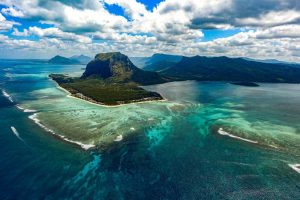Delivering exercise referral training to increase physical activity levels in Mauritius

Mauritius is a beautiful, culturally diverse, Indian Ocean Island Nation situated east of Africa and Madagascar. With a population of 1.3million, the country is well known for its stunning coastlines, turquoise lagoons, and lush vegetation. But many do not know that Mauritius has one of the highest rates of diabetes in the world. The International Diabetes Federation report that 26.5% of the adult population are affected, over double the world average of 10.5%.
 The high levels of non-communicable disease have been attributed to urbanisation, increasing obesity levels and physical inactivity across an aging population. Together, these place enormous pressure on the health care system. Encouraging active lifestyles are crucial for enhancing the quality of life, wellbeing, and empowerment of individuals and communities, as well as for fostering social integration and preventing negative effects on the economy.
The high levels of non-communicable disease have been attributed to urbanisation, increasing obesity levels and physical inactivity across an aging population. Together, these place enormous pressure on the health care system. Encouraging active lifestyles are crucial for enhancing the quality of life, wellbeing, and empowerment of individuals and communities, as well as for fostering social integration and preventing negative effects on the economy.
Over the past six years, staff from the Advanced Wellbeing Research Centre have offered support to help Mauritius increase physical activity levels and manage levels of non-communicable disease. Professor Rob Copeland provided support to the Mauritian Sports Council to develop their first sport and physical activity policy which was published in 2018. The implementation of this policy led to them being awarded a global policy award from the Association for International Sport for All in recognition of their work promoting sport across the country.
The policy aims to use sport and physical activity to increase the happiness, health and wealth of all Mauritian citizens and communities. Dr Anna Lowe has also delivered Mauritian physical activity clinical champions training to increase the conversations medical professionals are having with their patients surrounding physical activity.

One of the main areas of priority for the Mauritian Sports Council has been to set up a national exercise referral scheme. Sheffield’s National Centre for Sport and Exercise Medicine was a key inspiration for this, and Mauritius has recently adopted a similar model of co-location, bringing health care and exercise support together.
Following the successful completion of a pilot project, Emily Newton, Senior Lecturer in Physical Activity and Health at Sheffield Hallam, returned to deliver exercise referral consultant training. Emily teaches on both Sport and Exercise Science and Physical Activity Sport and Health BSc and is also an experienced exercise professional and also the AWRC’s training and education co-lead.
Emily provided a bespoke training course which focused on helping the students to develop the skills needed to increase physical activity levels to help prevent and manage non-communicable disease in inactive patients. This was delivered through the University of Technology Mauritius as a micro-credential.

The training included exploring the barriers to activity for the Mauritian population, with a strong focus on behaviour change and motivational interviewing to support patients to develop a more active lifestyle. Teaching also focused on helping the students understand the implications of many long-term health conditions on exercise before moving on to designing and delivering safe, client-centred exercise sessions.
A keen group of twenty-eight students completed the training. The group consisted of healthcare professionals, coaches, exercise professionals and educators, all highly motivated to expand their skills and knowledge. Training was delivered at the state-of-the-art Cote d’Or, the National Sports Complex. Student feedback has been extremely positive, praising the applied nature of the training and focus on communication skills and behaviour change. One student stated that “the tools and knowledge shared have proven invaluable, and I am grateful for this enriching opportunity”.
 Emily and the Mauritian Sports Council will continue to explore how exercise referral training can be a permanent element of the higher education curriculums in Mauritius, especially surrounding sport and health care programmes. It is essential that both health and exercise professionals have the knowledge and skills needed to support the local population to use physical activity and exercise to prevent and manage non communicable disease.
Emily and the Mauritian Sports Council will continue to explore how exercise referral training can be a permanent element of the higher education curriculums in Mauritius, especially surrounding sport and health care programmes. It is essential that both health and exercise professionals have the knowledge and skills needed to support the local population to use physical activity and exercise to prevent and manage non communicable disease.
